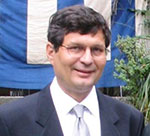Current estimates suggest that 40 of every 10,000 children have autism, and prevalence rates for ASDs are about 1 percent, according to background information in the article. Studies of siblings have found a concordance rate (the likelihood that if one child has the disorder, others will as well) of up to 14 percent. The authors note that in previous studies of twins, concordance rates for autism were relatively high for identical (monozygotic) twins, but nonexistent for fraternal (dizygotic) twins.
Further, studies that depended on differing methods of diagnosis have resulted in a broad range of estimates of autism’s heritability. “However,” the authors state, “none of these more recent studies included structured clinical assessments by both parental interview and direct child observation, which is the contemporary standard for establishing the diagnosis of autism or ASD.”
In the California Autism Twins Study, researchers used data from the California Department of Developmental Services to identify potential participants. The researchers assessed twin pairs in which at least one child had an ASD diagnosis, using the Autism Diagnostic Interview–Revised, a structured parent interview and the Autism Diagnostic Observation Schedule, as well as other tests to determine verbal and nonverbal cognitive abilities. Two diagnoses were utilized: strict autism and ASD. Children with autism or ASD that was included in the initial data and confirmed by the researchers were considered “probands.”
The final analysis included 54 pairs of identical twins and 138 pairs of fraternal twins (of which 80 were comprised of a boy and a girl). Researchers found the likelihood of both children having autism or ASD was higher among identical twins than among fraternal twins. They also used modeling to estimate how much of the risk could be attributed to genetic factors. This analysis demonstrated that more than half of the variance in risk was probably explained by shared environmental factors versus less than 40 percent of the risk owing to genetic heritability.
“The results suggest that environmental factors common to twins explain about 55 percent of the liability to autism,” the authors write. “Although genetic factors also play an important role, they are of substantially lower magnitude than estimates from prior twin studies of autism…. The finding of significant influence of the shared environment, experiences that are common to both twin individuals, may be important for future research paradigms.”
Material adapted from JAMA.
Reference
Arch Gen Psychiatry. Published online July 4, 2011. doi:10.1001/archgenpsychiatry.2011.76.

This will surprise few aware readers.
“environment” ? (aka Epigenetics) covers a huge field. Are we talking about our toxic chemically soaked environment ? Social/family/cultural environment. Educational/training environment ?
To me, all this study does is downgrade the theory of genetics and autism, but gives us little else. Surely there are subtle indications buried in this study that could be discussed. Do you have more ?